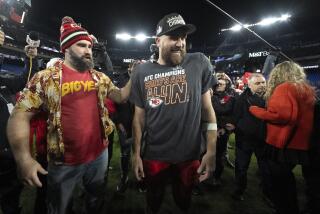Max McGee Parties, Plays and Gives
- Share via
My, my, the mischief of Maxwell McGee now sounds so quaint as to be the stuff of schoolboy innocence. Mostly, he stayed out late. He once claimed an NFL record in breaking curfew 11 consecutive nights. Some nights it got so late as to be dawn on his return to his bachelor lair. Such as the night before the morning of the first Super Bowl, when he left his room despite Vince Lombardi’s threat of a $5,000 fine.
By then McGee was an antique, at 34 a benchwarming reminder of the phenom who had caught more touchdown passes than any Packer since the sainted Don Hutson. But old football players are still young men, and as such are susceptible to invitations spoken softly.
As McGee later said, “I’d met some blonde the night before, and I was on my way to pay my respects. I didn’t feel I was letting the team down any because there wasn’t a chance in hell I’d play.”
Came the dawn of the NFL’s historic day when the Packers would meet the Chiefs in Los Angeles Memorial Coliseum and here came Max McGee into his hotel at 7:30 a.m. His gait was that of a sailor on heavy seas. His eyes were imprecisely focused on distant images.
That afternoon, Paul Hornung remembers, he sat alongside his roomie McGee on the Packers bench. Neither man, partners of the night for a decade, figured to play that day. The great Hornung was injured and hadn’t played in a month. He nudged the zombie McGee and asked, “What if you gotta play?”
“Couldn’t do it,” McGee said.
But Lombardi’s voice often moved people to impossible work.
On the game’s fourth play, starting left end Boyd Dowler was injured.
Into McGee’s ear came a roar.
Lombardi in full voice.
“McGee, get in there.”
Happy news last week, almost 32 years after that Super Bowl: Max McGee gives away $1 million.
McGee gave away the money because of his son. Dallas McGee is 9 years old and has juvenile diabetes. Six times a day his blood is tested and six times a day he eats, a regimen made necessary by the disease that destroys blood vessels. Medicine’s search without discovery for the origins of diabetes leaves children such as Dallas vulnerable to what his father calls “one of those creeping diseases.”
Max McGee has worked the last 19 years as a Packers radio analyst. He has raised money for diabetes research through golf tournaments and his “Catch to Cure” campaign based on pledges for passes caught by Packers.
Hornung is Dallas’ godfather. “For a long time now,” he says, “I knew Max wanted to do something like this.”
What a thing: He pledged $1 million for genetic research on diabetes. The money will go to a Milwaukee hospital, Children’s Hospital of Wisconsin. The hospital plans to raise $10 million to create the Max McGee Research Center.
With as many as 20 researchers, the center’s director will be Dr. Soumitra Ghosh, now working at the National Institutes of Health in Maryland. “We brought in a free agent we think is going to be like another Brett Favre,” McGee says of the physician. “What Brett Favre did to the Packers, he’ll do to the Max McGee Research Center.”
The Max McGee Research Center?
In that other life, the corner saloon.
On rookie end Bob Long’s arrival in Green Bay, Lombardi told him, “This Max McGee is one of the greatest ends of all time, and I just want you to watch him and do everything he does.”
“So I watched Max,” Long told Jerry Kramer, Packers guard-turned-author, “and I tried to do everything he did. It wasn’t so bad on the field, but those nights killed me.”
No surprise, then, to hear McGee say he all but fainted at Lombardi’s roar on that headachy day of the first Super Bowl, Jan. 15, 1967.
His first series, the Packers came to third-and-3 at the Chiefs’ 37-yard line. From there, Bart Starr threw a pass slightly behind McGee. At the 19, he reached back, somehow caught it and ran it in for the first touchdown in the first Super Bowl.
By game’s end, the old man who didn’t expect to play had caught seven passes in the Packers’ 35-10 victory, two for touchdowns.
Clown, rogue, carefree bachelor, Super Bowl star, Packers Hall of Famer--all of that, and more. With teammate Fuzzy Thurston, McGee created a chain of restaurants called Chi Chi’s. That money made him a partner in an investment firm that made the money that made possible the Max McGee Research Center.
“My whole family has been affected by this disease,” McGee says. “I want to do my part to find a cure.”
With a laugh, he noted one other motive. “I want to be remembered for something other than being the guy who stayed out all night before the Super Bowl.”
More to Read
Go beyond the scoreboard
Get the latest on L.A.'s teams in the daily Sports Report newsletter.
You may occasionally receive promotional content from the Los Angeles Times.










